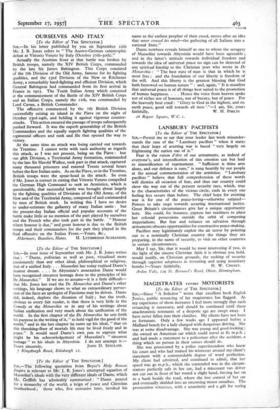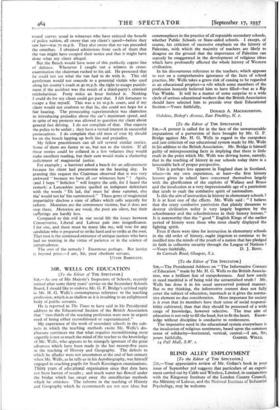MAGISTRATES versus MOTORISTS [To the Editor of THE SPECTATOR.]
Sfit,—Since " A Solicitor " wrote that excellent book English Justice, public trouncing of lay magistrates has flagged. As my experience of them increases I feel more strongly that such trouncing is necessary, and should be continued until these anachronistic remnants of a despotic age are swept away. I have never fallen into their clutches. My clients have not been so fortunate. Only a few weeks ago I appeared before a Midland bench for a lady charged with dangerous driving. She was at some disadvantage. She was young and good-looking ; she owned an American car which could travel at 8o m.p.h. ; and had made a statement to a policeman after the accident, a thing which no person in their senses should do. She was prosecuted by a police superintendent who knew his court and who had trained his witnesses around my client's statement with a commendable degree of word perfection. My client had admitted, and continued to admit, that her speed was 4o m.p.h., which she contended was in the circum- stances perfectly safe in her car, had a miscreant van driver not cut out in front of her round a slight bend, forcing her on to a bank beside the road, where she lost control of her car and eventually skidded into an oncoming motor omnibus. The prosecution witnesses, with a unanimity and a gift for seeing round curves usual in witnesses who have enjoyed the benefit of police tuition, all swore that my client's speed—before they saw her—was 70 m.p.h. They also swore that no van preceded the omnibus. I obtained admissions from each of themthat the van might have escaped their notice and that it might have done what my client alleged.
But the Bench would have none of this perfectly cogent line of defence. Whenever I caught out a witness in cross- examination the chairman rushed to his aid. He protested that he could not see what the van had to do with it. This old gentleman would not concede to a potential victim who sped along his county's roads at 4o m.p.h. the right to escape punish- ment if the accident was the result of. a third-party's criminal misbehaviour. Forty miles an hour finished it. Nothing I could do for my client could get past that. I felt fortunate to escape a fine myself. This was a zo m.p.h. court, and if my client would not conform to that lie, she could not hope for a fair hearing. The prosecuting superintendent was shameless in introducing prejudice about the car's maximum speed, and in spite of my protests was allowed to question my client abOut general fast driving. I do not complain of that. One expects the police to be unfair ; they have a vested interest in successful prosecutions. I do complain that old men of over 65 should be on the bench lapping up both lies and prejudice.
My fellow practitioners can all tell several similar stories. Some of them are funny to us, but not to the victim. If all these stories could be collated in a few volumes they would make excellent reading, but their sum would make a shattering indictment of magisterial justice.
For example ; a barrister asked a bench for an adjournment because his client had pneumonia on the hearing day. In granting this request the Chairman observed that it was very awkward " because we have all our witnesses here " ! Again, (and I hope " Solicitor " will forgive the crib, for I heard the remark) a Lancashire justice quelled an indignant defendant with the words " Eh lad, tha' must ha' done summat, else tha' would not ha' bin summonsed." These gems of magisterial impartiality disclose a state of affairs which calls urgently for reform. Motorists are the commonest victims, but it does not stop there. Motorists are vocal, the poor are silent, but their sufferings are hardly less.
Compared to this evil in our social life the issues between Conservative, Liberal and Labour pale into insignificance. I for one, and there must be many like me, will vote for any candidate who is prepared to strike hard and to strike at the root. That root is the continued existence of antique justices who have had no training in the virtue of patience or in the science of jurisprudence.
The cost of the remedy ? Enormous perhaps. But justice is beyond price.—I am, Sir, your obedient servant, UTTER BARRISTER.











































 Previous page
Previous page